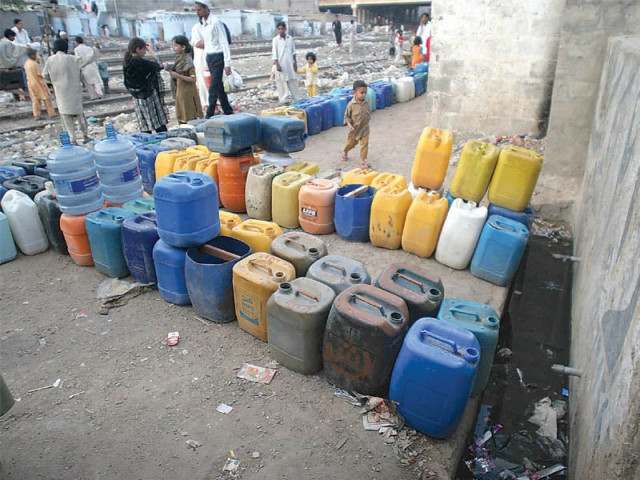Want water? Start paying more, says water board
Utility wants government to set up regulatory body to determine realistic water tariff.

A formal proposal will be sent to establish the National Water Regulatory Authority, which will work on the lines of National Electric Power Regulatory Authority (Nepra), and Oil and Gas Regulatory Authority (Ogra), KWSB Managing Director Misbahuddin Farid told The Express Tribune on Monday.
“It’s time to rationalise the prices and encourage water conservation,” Farid said talking about excessive wastage in houses and factories. “People don’t care how much water they use as there is no metering system to bill the quantity.” Households, shops and factories in Karachi pay an average of Rs100 for 1,000 gallons of water per month. “Our cost has surged to Rs700 for every 1,000 gallons. The gap between the cost of supplying water and the revenue being raised is just too big,” said Farid.
Cost of raw material and input, especially the charges of power consumption at its 188 pumping stations. The water charges have been raised three times since 2008.
The KWSB is also unhappy with the municipality for allowing construction of commercial plazas and apartments without consulting civic agencies. “High rises are cropping up along the entire length of Shahrae Faisal. In Gulistan-e-Jauhar, cantonment boards are giving permissions for buildings with 1,200 consumers,” Farid said.
On paper, Karachi gets 650 million gallons per day (mgd) of water. The actual supply is around 450mgd due to leakages and pilferage. But the demand stands at a staggering 1,100mgd.
The KWSB managing director thinks the 30 per cent leakage loss is “not that bad considering the size of Karachi”.
The issue of water theft is also hurting the board. Around 400 cases have been registered against people for stealing water from KWSB pipelines and then selling it commercially, causing losses of millions of rupees every month. “These are criminals who quit the heroin trade to sell water... just imagine how lucrative the water business could be,” said Farid. Slum settlements pose another challenge for the water board as almost 40 per cent of the city comprises unsanctioned residences, which do not pay for water. Land allotments entitle such settlements to all civic facilities, including water, gas and electricity. The KWSB’s assertion is that it does not get any revenue from these localities.
The real problem for KWSB is, however, a network of illegal hydrants from where 242mgd of water is siphoned off daily, says Parveen Rehman, the director of the Orangi Pilot Project, quoting from a recent survey.
Published in The Express Tribune, September 4th, 2012.



















COMMENTS
Comments are moderated and generally will be posted if they are on-topic and not abusive.
For more information, please see our Comments FAQ